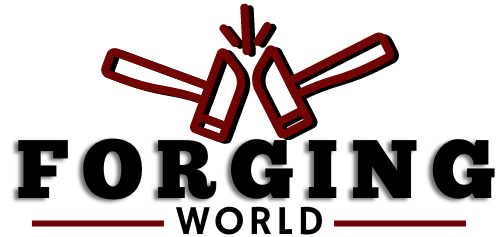When you are a beginner blacksmith you can’t wait to get your hands on something on which you can hammer. Rebar is an extremely popular material that many smiths use, especially in the beginning phases. Making your tools so you don’t have to buy them is the beauty of blacksmithing.
The question is whether rebar is a good material for forging tools? Since rebar is mysterious steel, it is typically no the best material to forge your tools out of. It is very unpredictable in the heat-treating process you never know what to expect at the end of the forging session. However, you can forge some decent tongs from rebar. Rebar in blacksmithing is typically used for decorative projects.
As you can see, rebar still has its place in blacksmithing. In the rest of the article, I will analyze this mysterious material in greater detail. You will also learn whether you can use it to forge basic forging tools.
And now let’s start.
What Is Rebar?
Rebar is known as some form of reinforcing bar for construction purposes. Rebar significantly increases the strength of the structure. Its surface is typically deformed in order to offer a better bond with the concrete. Note that there are various types of rebar bars, including:
- Carbon Steel Rebars
- European Rebar
- Galvanized Rebar
- Stainless Steel Rebar
- Epoxy-Coated Rebar
Carbon steel rebar is one of the most widely used types of rebar. The advantage of using this type is its versatility. On the downside, carbon steel rebars are known to corrode more easily.
European rebar is somewhat softer and because it is much easier to bend. This rebar is mostly made from manganese, so bending properties are no surprise.
Galvanized rebar is known for its great corrosion resistance. However, don’t ever use galvanized steel in the shop because of zinc fumer. These fumers could seriously damage your lungs.
Stainless steel rebar is by far the most expensive type of rebar you can find on the market. An interesting fact is that stainless steel rebar is 1500 times more resistant to corrosion than carbon steel rebar. Using it for forging tools would be overkill.
Epoxy-coated rebar is simply carbon steel rebar with epoxy coating. When comparing it with a carbon steel rebar, they have a similar textile strength but epoxy rebar is more resistant to corrosion.
Rebar is also categorized by its grades which differ in the amount of tensile strength. So, grade 33 is on the lower end of strength. Note that strength increases together with the grade number. Grade 40 has a yield strength of 40,000 PSI and tensile strength of 60,000 PSI. These amounts are considered as the minimum level. Grade 60 has a minimum yield strength of 60,000 PSI and 90,000 is the amount of minimum tensile strength.
In terms of differentiation between grades of rebar, one of the easiest methods is to look for the stamped letters and numbers between the lines on the material. For example, if it says B6S, the first number is the manufacturer, the number 6 means it is grade 60, and the letter S means that is made of steel. Another method is to observe the lines between the outside ribs. If there is no line, it is a grade 40 rebar.
Can You Use Rebar for Forging Tongs?
Tongs are an essential tool of every blacksmith as you need something to hold working material. A nice set of tongs will make your work much safer and easier. The crucial thing is that they have to fit the type of work you are doing.
Rebar can be used for forging tongs. It is a cheap and easily available material. Since blacksmithing tongs don’t require a hardening process, rebar may be a good choice. However, rebar is a very unpredictable steel. There is a high probability of forming cold shuts which can cause cracks and fractures in some places. Instead, mild steel is typically recommended for forging tongs.
If you are a beginner blacksmith who wants to make his own tongs, I would recommend using mild steel. It is also cheap, easily available, and also easy to forge. If you are buying a new 10-foot piece of mild, chances are you will spend less money than buying the same size of rebar. You will also get much better tongs for that price.
I remember my first (and also last) tongs made from rebar in the beginning phases of my blacksmithing career. Even that tongs weren’t that great, it still was a good practice. So, if you are a beginner who only wants to practice forging tongs and also have plenty of rebars, do it. You won’t regret it. On the other side, if you want a nice set of tongs that will serve you for a longer period, use mild steel.
Recommended reading:
The Complete Guide to Blacksmithing Tongs (2020)
Can You Use Rebar for Forging a Hammer?
You can say that a hammer is an extension of the smith’s arm. Another nice way of putting it is that hammer is to a smith like a brush is to an artist. Without a hammer, you cant forge anything. Therefore, it is a vital blacksmithing tool.
When it comes to material properties for hammers, shock resistance, and wear resistance are very important factors. How strong and tough your hammer is? How well it holds an edge? How do you heat treat hammer? These are all critical questions you should ask yourself before you start anything. If your hammer has low toughness and has bad edge retention, it can be a very dangerous tool to work with. So, what about rebar? Yes or no?
Generally, rebar is not the recommended material to forge a hammer from. It is too soft and doesn’t hold the edge very well to be used as a blacksmithing hammer. Instead, 1045, 4140, and 5160 steel are considered to be some of the best choices for making hammers. However, rebar can be used for practicing purposes.
So, if you want a good-quality and also long-term solution, I recommend using some of the above-mentioned steels. As I have said numerous times before, rebar is simply unpredictable metal. Sometimes you may manage to forge a nice tool but in most cases, you won’t.
Recommended reading:
The Complete Guide to Blacksmithing Hammers
Things You Can Make Out of Rebar
Don’t get discouraged just yet. There are plenty of other things you can make from rebar. Chisels are a tool that can be made of rebar. Chisels are another extremely useful tool for every smith. They also come in a variety of sizes and shapes. As you may already know, their main role is to cut metal. They are divided into cold and hot types.
Rebar is typically used for making hot chisels. They are much more common in blacksmithing. As their name suggests, hot chisels are used to cut material when is hot. Hot chisels have an edge bevel of 30 degrees which makes them sharp. Note that you should never use them for cold cutting as they can crack easily.
If you are interested in making some decorative projects out of rebar, be sure to check What Can You Make Out of Rebar? – 7 Forging Ideas.



